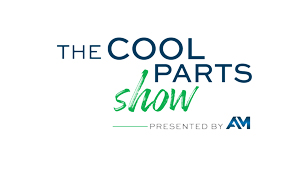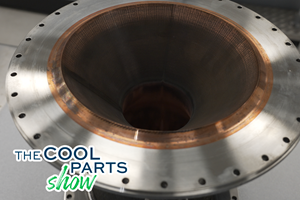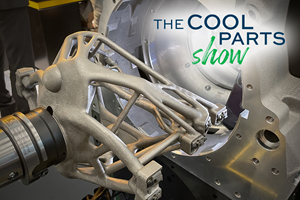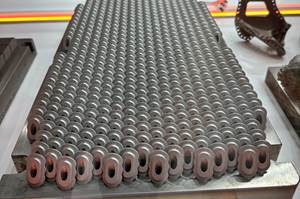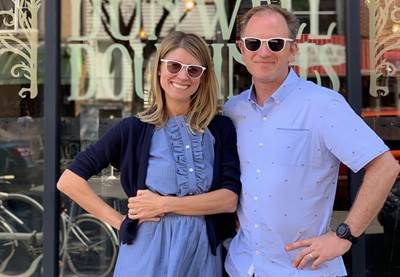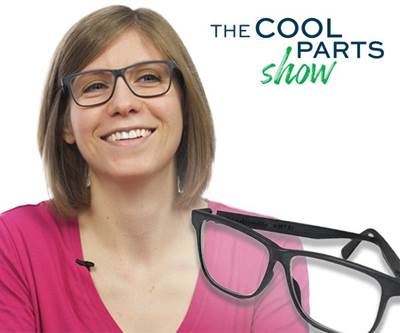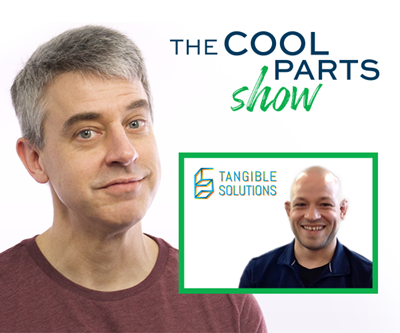From Idea to PPE Product in 10 Days: The Cool Parts Show #13
Fitz Frames' custom 3D printed glasses have turned out to be a launch point for an item of personal protective equipment (PPE) used in the fight against COVID-19.
Share
When the news came that hospitals were short on personal protective equipment (PPE), Fitz Frames brainstormed how it might be able to help. Could the company’s EOS selective laser sintering (SLS) 3D printers switch from making custom glasses frames to face shields or masks? After speaking with a number of healthcare professionals, it became clear that doctors and nurses on the front lines of the COVID-19 pandemic needed another type of PPE, something that Fitz Frames was already well-equipped to produce: protective eyewear. Ten days after this realization, the company had a new product ready for order. In this special quarantine episode of The Cool Parts Show, we check in with Katie Bassett, VP of product and operations, to learn about Fitz Protect, the company’s new line of protective glasses for healthcare professionals. Bassett speaks to additive manufacturing’s capability for rapid product development, and how Fitz plans to provide as many pairs of the glasses as possible free of charge. This video is part of a series in which we revisit companies from past episodes to find stories of how AM is advancing in surprising ways during the coronavirus pandemic.
The Cool Parts Show is a video series from Additive Manufacturing Media that explores the what, how and why of unusual 3D printed parts. Watch more here.
Have a cool part to share? Email us.
Resources and links
- Fitz Protect GoFundMe page
- Fitz Frames website & app download
- 3D Printed Custom Glasses: The Cool Parts Show S2E2
-
These 3D Printed Glasses Are Designed to “Solve” Kids’ Eyewear
Transcript
Stephanie Hendrixson, Additive Manufacturing
Can a custom consumer product be adapted into personal protective equipment? It's actually a pivot that makes more sense than you might expect. We'll talk about it in this special episode of The Cool Parts Show.
Peter Zelinski, Additive Manufacturing
I'm Pete.
Stephanie Hendrixson
I'm Stephanie, and welcome to a special edition of The Cool Parts Show. We have been checking in with previous subjects of the show to find out what's new, what's different and how their business has been affected by the COVID-19 pandemic.
Pete Zelinksi
We're filming this from within the isolation period of the coronavirus pandemic. It looks like we're sitting side by side. That's a camera trick. We're actually separated.
Stephanie Hendrixson
So our check-in today is going to be with Fitz Frames. They were featured in season two of The Cool Parts Show. We'll put a link in the description below if you haven't seen the episode. But before we get started, Pete, would you just recap what we talked about in that episode?
Pete Zelinksi
Sure. Fitz Frames customized glasses made through 3-D printing, eyeglasses, because every face is different. So this is an example of mass customization through additive manufacturing Fitz Frames, takes advantage of the measurement technology that's in our smartphones. So a customer can can scan their face with the phone, gives measurements to Fitz Frames that they can use to make glasses precisely tailored to the dimensions of your face. Very comfortable glasses as a result. Each of us has a pair. Stephanie, you're wearing yours right now.
Stephanie Hendrixson
I am indeed. So I was able to check in with Katie Bassett, who's the Vice President of Product and Operations, who we spoke to for that episode to learn what's new and what they're working on now. So you might remember that back in that first episode, you tease me a little bit for buying glasses, because at the time, Fitz Frames was marketing these for children and they do now officially sell glasses for adults.
Pete Zelinksi
OK. You were ahead of your time.
Stephanie Hendrixson
Yeah. And so. So that side of the business is kind of progressing as usual, but things are looking a little bit different at Fitz Frames now because they have launched another product that is directly related to the coronavirus. So they have a new product line. It's called Fitz Protect and it's protective eyewear for health care workers. So it's really similar to their their standard product that I'm wearing right now. It's still custom. You can still get prescriptive lenses. And actually, the material that they're using in the regular glasses proved to be a really good fit for this. So this is Katie explaining a little bit about why.
Katie Bassett, Fitz Frames
The Nylon-12 that we're using for our normal glasses actually turns out that it's really well suited to be, not necessarily, it can be sterilized, but to be cleaned really well. You can use diluted bleach. You can use alcohol on it. You can even in some cases, you can actually heat them up to sterilize. But yeah, the idea is that actually it's a really stable material. Part of the testing that we're doing with doctors also was we we're asking, you know, what do you do usually right now to clean your other equipment. And we wanted to make sure that these would be able to withstandthat and they do. Which is great.
Pete Zelinksi
In talking to Katie, did you get the sense that it's more prescription ordering or just people ordering the straight lenses entirely for the protection?
Stephanie Hendrixson
So she said it's actually like a sort of an even an even mix right now and brought up something that I hadn't connected with all this. So the CDC recently came out with some guidelines suggesting that people don't wear contacts right now because, you know, that's another opportunity to touch your face and potentially infect yourself with this virus. And so actually, the prescription lenses and the fact that they can make this eyewear, that's prescription is really helpful to doctors and nurses who would typically be wearing contacts or who need glasses on a daily basis. If they're prescriptive lenses are built into their their eye gear that's one less piece of PPE that they have to wear. And it's just kind of consolidating all the equipment that they need.
Pete Zelinksi
So how are people ordering these?
Stephanie Hendrixson
So it's just like you would order your regular glasses. You go through the Fitz Frames app and you're scanning your face so they can get your measurements. But they're trying to provide as many of these to health care workers at no cost as as they can. So there's actually a gofundme where you can donate to this cause and help get health care workers this eyewear for free. They've shipped a couple hundred so far. They're working to scale up. And so Katie told me a little bit about what that looks like.
Katie Bassett
My effort in the last couple of weeks has really been trying to figure out how we can expand production really quickly. So we're actually we just started working with a partner to print for us. So that's good. So that will expand our production right now. And then we actually also just got another printer. The emergency drop on another printer. Yeah, so we're going to be standing that up and that'll be really adding to our capacity. Pretty soon we're hoping to be able to do a few hundred a week, if not more actually.
It has shown us what we can do and it has also shown us like what we need to work on a little bit. The capacity for sure or something that like immediately, I mean as soon as we started doing this, we didn't have enough capacity. So that's something that we're really having to work on. And that's not the printers, but it's also like, you know, how do we handle this many orders all at once, how do we track and process all of that?
And then on the positive side, though, like the fact that we were able to get this product from zero to live in 10 days, I think even surprised ourselves. Like we built this system to be able to bring a new product to market really quickly, that was always part of what we wanted to do, but we never really tested it. And so, you know, when it came down to this need and we actually did it faster than we even expected, it was just like, wow, like everything that we've been working on the last couple of years really paid off. And yeah, obviously the additive manufacturing part of it is a core part of it. There's no way we would've been able to do that if it was, you know, probably any other kind of manufacturing. Really?
Stephanie Hendrixson
Yeah, that's a great way of putting it, just like, All this stuff that we've been talking about with additive for so long, we're now and like this emergency situation where people are finding out like, oh yeah, actually all the hard work that we did is paying off. We have all the tools that we need to do this really quickly.
Katie Bassett
I guess just one of the other cool parts of this is, you know, product zero to 10 days is like, great we got something out there. But as like a products person, I'm just like terrified. Like, there's no way we did a good job in 10 days, I'm thinking. But, you know, we did as much testing as we could and the more feedback we get from doctors actually using them, like in surgeries with COVID patients or delivering babies to COVID positive mothers like we're getting this feedback, where they're saying these are better than, not just better than nothing which is what we were shooting for but better than other eyewear that they have available to them.
Pete Zelinksi
So I was really struck by that last part. Additive enables product development at such a speed that even someone who spent her whole career in product development like she has, it is alarming how quick it's possible to proceed.
Stephanie Hendrixson
Right. And they're still not even done with the product development. So they are shipping these glasses, but they're still refining the design, trying to make them more comfortable, trying to make it print faster. So they're gonna keep working on it even as they're shipping product out.
Pete Zelinksi
I also love that point I heard you bring out that what we're seeing is additive realizing its promise, you know, within this period. And I've got a terrific example of that in the episode we're going to do next.
Stephanie Hendrixson
So I think that's it for this update. Stay tuned for one more of these and then we will have our special episode about a production story that's come out of the coronavirus pandemic. So make sure you're subscribed. Click the bell icon on YouTube and you'll get notified about all of our new videos.
Pete Zelinksi
Yeah, be sure to subscribe, to catch the new stuff, to see the existing stuff, to watch our Fitz Frames original episode, to watch all of our episodes, go to thecoolpartsshow.com.
Stephanie Hendrixson
So we'll have that link and a link to the Fitz Protect GoFundMe page and some other resources in the show description below. Thank you for watching.
Related Content
3D Printed NASA Thrust Chamber Assembly Combines Two Metal Processes: The Cool Parts Show #71
Laser powder bed fusion and directed energy deposition combine for an integrated multimetal rocket propulsion system that will save cost and time for NASA. The Cool Parts Show visits NASA’s Marshall Space Flight Center.
Read More3D Printed Cutting Tool for Large Transmission Part: The Cool Parts Show Bonus
A boring tool that was once 30 kg challenged the performance of the machining center using it. The replacement tool is 11.5 kg, and more efficient as well, thanks to generative design.
Read More8 Cool Parts From Formnext 2023: The Cool Parts Show #65
New additive manufacturing technologies on display at Formnext were in many cases producing notable end-use components. Here are some of the coolest parts we found at this year’s show.
Read MorePreassembled Turbojet Engine, 3D Printed in One Build: The Cool Parts Show #75
Turbojet engines typically consist of hundreds or thousands of parts, but this engine — 2023 winner of The Cool Parts Showcase for Best Proof of Concept — was 3D printed as just two pieces, with the monolithic rotor embedded inside the stationary engine shell.
Read MoreRead Next
Fitz Frames Brings Mass Customization to Eyewear with Affordable 3D Printed Glasses Frames
Glasses don’t need to be ill-fitting and frustrating to buy. Fitz Frames offers a different kind of shopping experience (using augmented reality and 3D measurement) to produce custom glasses with 3D printed frames that are affordable, durable, comfortable and stylish.
Read More3D Printed Custom Glasses: The Cool Parts Show #8
Fitz Frames has reimagined glasses, from the frames to the ordering process. See how the company manufactures glasses customized to every face in this episode of The Cool Parts Show.
Read MoreImplant Maker Increases Production: The Cool Parts Show #12
Tangible Solutions has been 3D printing more implants than ever before as hospitals get ready for the coming surge in elective surgeries. The Cool Parts Show checks in to explore how additive manufacturing is advancing during the coronavirus crisis.
Read More
.jpg;width=70;height=70;mode=crop)



